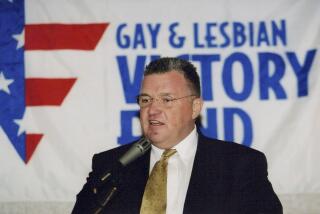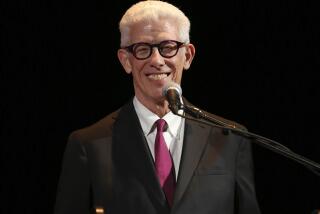Jim Kepner; Pioneer Activist Founded Gay Archives in 1942
Jim Kepner, founder and curator of the International Gay and Lesbian Archives and a pioneer gay activist, has died. He was 74.
Kepner died Saturday at Midway Hospital in Los Angeles after surgery for a perforated intestine, said Ernie Potvin, a member of the archives executive board.
The archives, which Kepner started in 1942, contain about 22,000 books, more than 100,000 newspaper and magazine articles dating from 1906, matchbooks from gay bars, videos, photos, letters and such esoterica as a pink leather motorcycle outfit worn at a Los Angeles gay charity event.
The collection, valued by gay studies scholars around the world, is housed at USC. Other universities, including UCLA, Stanford and UC Santa Barbara, had vied for the archives.
“All of the public institutions for many, many years seemed like our enemies. So it’s very astonishing,” Kepner told The Times when USC won the treasure two years ago.
The Texas-born Kepner started collecting memorabilia and reference material when he was working as a railroad clerk in San Francisco in the early 1940s. At that time, he said, he and gay friends were just “trying to figure a way to come out of the closet.”
“I’ve always been inquisitive,” Kepner told The Times in 1988, “and, even though I never envisioned that the collection would evolve to what it has become, I always had an innate sense that what I was doing was important. It was something I felt driven to do.”
Kepner continued his self-described “pack rat” methods after World War II during three years as a reporter for the Daily Worker, the Communist newspaper, in New York. He lost that job and was expelled from the Communist Party when party officials became aware of his sexual orientation.
“It was a subtle kind of thing, for those days,” he said. “But there was no doubt left as to why I was more or less asked to move along.”
The ouster awakened Kepner’s activism two decades before gay causes became popular. He moved to Los Angeles, where he became an early member of the Mattachine Society, an important gay rights group during the 1950s, and other organizations championing radical causes.
He edited One, the first regular-circulation American magazine for and by gays and lesbians, which had to go to the U.S. Supreme Court for the right to distribute through the mail. Kepner also taught gay studies courses at One’s office as early as 1956, decades before colleges began listing such classes.
Kepner was active in the gay community in 1968 when mass arrests at the Wilmington gay bar Patch prompted gays to go to a harbor police station waving flowers in a “petal protest.” The incident was a precursor to the bloody June 28, 1969, Stonewall Inn riots in New York’s Greenwich Village, which is considered the start of the gay rights movement.
But it was the “petal protest” rather than the Stonewall riots, Kepner believed, that prompted change in Los Angeles. The protest sparked the founding of several gay organizations, a legal aid group, a theater and film club and the Metropolitan Community Church.
Memorial services for Kepner are pending.
More to Read
Sign up for Essential California
The most important California stories and recommendations in your inbox every morning.
You may occasionally receive promotional content from the Los Angeles Times.










